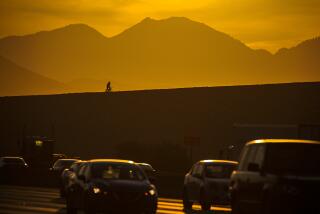Why You’re So Tired Today
- Share via
A whole bunch of studies on sleep came out recently. If you read them all, including the footnotes, you wouldn’t have any trouble, you know, sleeping. They prompted some waking debate about methodology. But generally we’ve learned from these sophisticated studies that sleep is important, everyone needs several hours a night, some people have trouble sleeping and if you don’t get sufficient sleep you may be crabby or worse.
These findings--hey, are you still awake?--have particular relevance this morning because 100% of Americans who aren’t in Hawaii, Arizona and some independent parts of Indiana got one hour less sleep last night. That’s because of this 86-year-old thing called daylight saving time that happens the first full weekend of April and the last weekend in October. Remember, spring ahead, fall back?
Daylight saving doesn’t really save or do anything to daylight except move it over a little to life’s evenings. It was invented by city people to save evening energy and provide an extra hour’s light to fool around after work or get home safely. City folks didn’t care one standard second about the disruption that daylight saving wreaks on America’s dwindling population of early-rising farmers. Forget the roosters. Until Saturday, farmers were just beginning to enjoy the sun rising a minute earlier every day and waking up to daylight again for the first time since, well, around the last weekend of last October. But now, boom, for them it’s Darkness Saving Time again.
Worse, seriously, is the impact on dairy cows, whose milk production relies on routine and who don’t wear watches. Yesterday, they instinctively arrived for milking at 6 a.m. Today, 6 a.m. comes at 5 a.m. cow time; they’re awakened an hour early and instantly they’re an hour late. It’s even worse in October when 6 a.m. becomes 7 a.m. You stand in line an extra hour with a full udder and see if you favor daylight saving time. Farmers relieve this untimely bovine discomfort by adjusting Udder Milking Time 15 minutes a week for four weeks. Time is milk, milk is money, and cows apparently don’t track quarter-hours.
But back to humans. The typical nonfarming one needs seven to 8.5 hours of sleep per night, studies say; teenagers need 9.25 hours. College students need none until they’re home, when they require 14 minimum. Besides hatching impatience, irritability and unhappiness with everything and everyone working so diligently to get so perfectly in your way, sleep shortages cloud thinking and spawn inattention--not good, for instance, for truck drivers. Sleep looks like inactivity, but the body and brain need quality time for resting, revitalizing, downloading. So today, we should be a little more patient with each other. And don’t walk behind any dairy cows.






